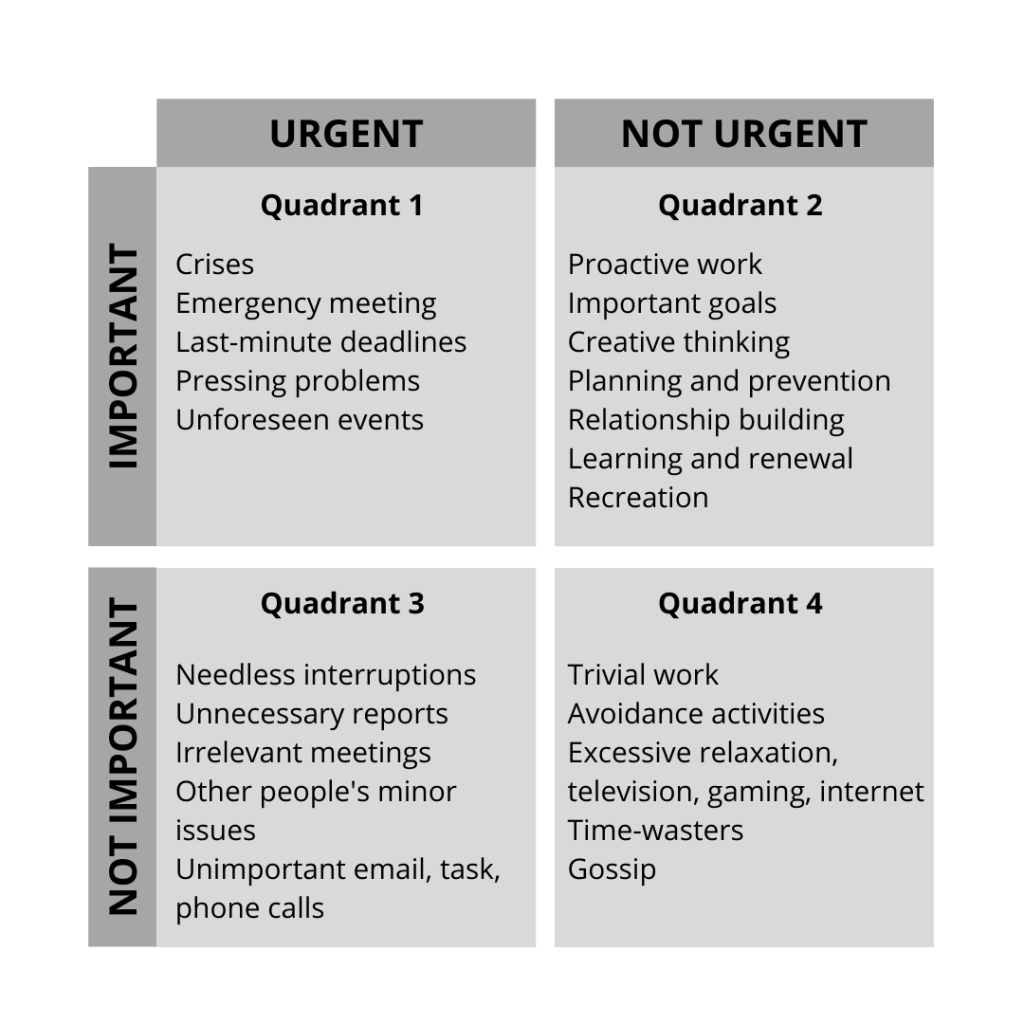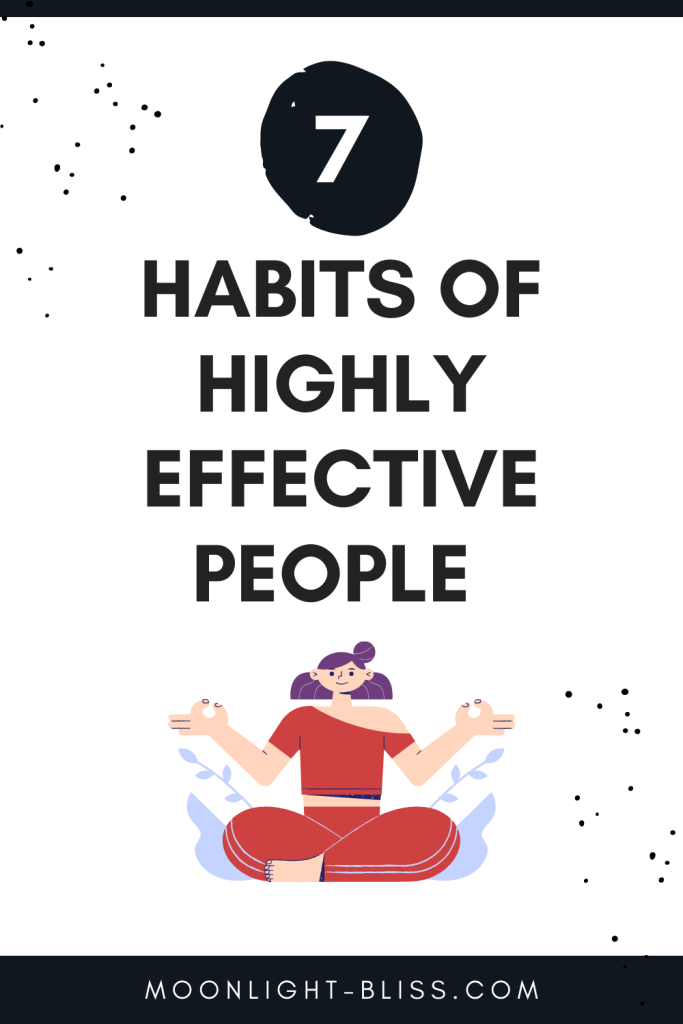Lately I have been on a journey of self improvement and listening to audiobooks related to that. And one book that has left the most impact on me is The 7 Habits of Highly Effective People by Stephen R. Covey.
In his book Stephen R. Covey talks about 7 habits which everyone can adapt to improve their life be it personal, professional. He gives really great real life examples which make it easier to understand everything.
In this post I would like to summarize the 7 habits by Stephen R. Covey and write down the main takeaways from it.
1. Be Proactive
The first habit of highly effective people is to be proactive rather than reactive. These are two ways how people react to what happens to them.
A reactive person will complain and focus on the things which are out of his control. They are unhappy with their life and they feel like can’t do anything about it.
If I really want to improve my situation, I can work on the one thing over which I have control – myself. – Stephen R. Covey
A proactive person in contrast will focus on the things which are in his control and take action to improve his life. By being proactive they take responsibility for their own life.
2. Begin with the the end in mind
In his second habit Covey talks about how we keep ourselves busy by working hard for a promotion but do not check our real values and what we want to achieve in life.
To identify our core values for life he recommends to visualize your own funeral and ask yourself the following questions
Who is there? What are they saying about you? About how you lived your life? About the relationships you had? What do you want them to say?
Think about how your priorities would change if you only had 30 more days to live and start living by these priorities.
This will help you by defining a ‘personal mission statement’ as Covey calls it which is a clear vision of who you want to become and how you want to live your life.
The personal mission statement helps you to figure out what is important for you and whether you are working towards it or away from it.
This applies to every aspect of life every time you start a new project start with the end in mind what id goal of this project and how can I achieve it.
3. Put first things first
Covey say if we want to manage ourselves effectively we need to put first things first which means we need do to the important things first.
To identify the most important task on the right time Covey uses a time management matrix. This matrix is divided into the following 4 quadrants
Quadrant 1: Necessity
Quadrant 2: Effectiveness
Quadrant 3: Distraction
Quadrant 4: Waste
We need to focus on Quadrant 2 because it contains the effective personal management tasks.
The key is not to prioritize what is on your schedule, but to schedule your priorities. – Stephen R. Covey
It deals with things like building relationships, long-term planning, exercising, preparation. These are things we know we need to do but somehow don’t get around to actually doing because they don’t feel urgent.
When we focus on quadrant 2 we are thinking ahead, working on the roots and preventing crises from happening in the first place.
4. Think Win-Win
In today’s world there is a race of who is the best. It is a constant competestion. Stephen Covey suggests that we should see the world as cooperative rather than comparative. We should think Win-Win which means that agreements and solutions should satisfy and benefit both parties involved. This leads to long term relationships based on mutual trust and respect.
For thinking Win-Win we first need to have a abundance mentality which is the believe that there is enough for everyone out there and if the other person is getting more than me doesn’t mean there is nothing left for me.
5. Seek first to understand, then to be understood
The fifth habit by Stephen Covey is about how we communicate with each other. He says that when we are having a conversation with someone we are listening with the intention to reply which means while the other person is talking we are already thinking about what we can reply to what is being said but instead we need to listen with the intention to understand what the other person is saying.
Most people do not listen with the intent to understand; they listen with the intent to reply. – Stephen R. Covey
Covey suggests to develop empathic listening to better understand the perspective of the other person. Empathic listening goes beyond just listening to the words that are being said. It also focuses on the body language and tone of voice of the person speaking and helps to get a better understanding of what the other person wants to tell you and how you should reply.
6. Synergise
The term synergy comes from the Attic Greek word συνεργία synergia from synergos, συνεργός, meaning “working together”. Covey says that when we create synergie with others we can create greater value than we could if we worked alone. The reason is that different people have different perspectives and understanding on a matter and when you bring them all together it creates value.
Synergie is the ultimate form of teamwork and to achieve that we need to keep habit 4 and 5 in mind, think Win-Win and seek to understand.
7. Sharpen the Saw!
Abraham Lincoln said: Give me six hours to chop down a tree and I will spend the first four sharpening the axe.
In the last habit the saw is us and and if we want to stay effective we need to take some time out to take care of ourselves which Covey calls sharpening the saw. He identifies 4 areas we need to focus on and calls them four dimensions of human nature which are mental, physical, spiritual and emotional.
And here are some examples of how to sharpen these dimensions
Mental Dimension: read books, keep a journal
Physical Dimension: eat healthy, regular exercise
Spiritual Dimension: meditation, going out to enjoy nature
Emotional Dimension: help people in need, make someone happy
Overall it’s a very interesting book and I learned a lot especially the fifth habit made think a lot and work on my communication skills. I would totally recommend this book because this is just a summary of the 7 habits the book goes into more detail with much more real life examples of Stephen Covey personal and professional life. If you are not into reading I recommend the audiobook.
Are you already using these habits? or will you be adapting one from these? Let me know in the comments 🙂



Thank you for this post! I started reading this book at the beginning of the year, but I haven’t been able to get all the way through it because I got sidetracked by reading other books. I hope I’ll be able to finish it sometime, but it was nice to read a summary of the book!
– Pixie | Productive Pixie
LikeLiked by 2 people
It totally worth finishing it 😊
LikeLiked by 1 person